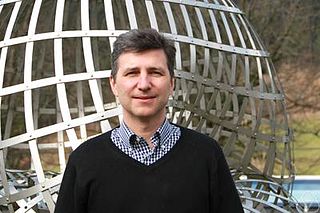Habilitation is the highest university degree, or the procedure by which it is achieved, in many European and non-English-speaking countries. The candidate fulfills a university's set criteria of excellence in research, teaching and further education, usually including a dissertation. The degree, sometimes abbreviated Dr. habil. or PD or D.Sc., is often a qualification for full professorship in those countries. The degree conferral is usually accompanied by a public oral defence event with one or more opponents. Habilitation is usually awarded 5–15 years after a PhD degree or its equivalent. Although in some countries Doctor of Sciences degree correlates with a position of Docent, it is closer in practice to the position of a Full Professor in the USA.

Heinz Fischer GColIH, OMRI, RSerafO, GCollSE is a former Austrian politician. He took office as President of Austria on 8 July 2004 and was re-elected for a second and last term on 25 April 2010, leaving office on 8 July 2016. Fischer previously served as minister of science from 1983 to 1987 and as president of the National Council of Austria from 1990 to 2002. A member of the Social Democratic Party of Austria (SPÖ) until 2004, he suspended his party membership as he became president.
Latin honors are a system of Latin phrases used in some colleges and universities to indicate the level of distinction with which an academic degree has been earned. The system is primarily used in the United States. It is also used in some Southeastern Asian countries with European colonial history, such as Indonesia and the Philippines, and African countries such as Zambia and South Africa, although sometimes translations of these phrases are used instead of the Latin originals. The honors distinction should not be confused with the honors degrees offered in some countries, or with honorary degrees.

Paul Gautsch Freiherr von Frankenthurn was an Austrian statesman who served three times as Minister-President of Cisleithania.

Maximilian Hussarek von Heinlein, ennobled to the rank of Baron (Freiherr) in 1917, was an Austrian statesman who served as the penultimate Minister-President of Cisleithania in the last stage of World War I, for three months in 1918.
Edmund Hauler was an Austrian classical philologist born in Ofen to a Danube Swabian German family. His father, Johann Hauler (1829–1888) was also a classical philologist.
Lothar Höbelt is an Austrian historian and adjunct professor of Modern History at the University of Vienna, known for his right-wing and nationalist viewpoints. His research areas are political and constitutional history of the 19th and 20th centuries, and the Thirty Years' War. He also lectures at the Theresian Military Academy.
Wolfgang Patsch is an Austrian physician, specialized in internal medicine/laboratory medicine and a professor in the Department of Pharmacology and Toxicology at the Paracelsus Private Medical University of Salzburg. He is known for his work in the fields of atherosclerosis, common metabolic disorders such as obesity, insulin resistance and type-2 diabetes and neurodegenerative disorders.
Helmut Veith was an Austrian computer scientist who worked on the areas of computer-aided verification, software engineering, computer security, and logic in computer science. He was a Professor of Informatics at the Vienna University of Technology, Austria.

Harald Grobner is an Austrian mathematician at the Faculty of Mathematics, University of Vienna. His research focuses on questions of algebra and number theory within the Langlands program.

Christian Friedrich Krattenthaler is an Austrian mathematician. He is a professor of discrete mathematics. From 2016 to 2020 he has been the Dean of the Faculty of Mathematics at the University of Vienna.
Felix Czeike was an Austrian historian and popular educator. He was an author and partly also editor of numerous publications on the history of Vienna and was the director of the Wiener Stadt- und Landesarchiv. His main work is the six-volume Historische Lexikon Wien.

Erika Weinzierl was an Austrian historian, gender researcher, and historian of Nazism. A member of the Austrian People's Party and the Curatorium of the Austrian Mauthausen Committee, she was the second director of the Department of Contemporary History of the University of Vienna, succeeding Ludwig Jedlicka. Weinzierl was a recipient of the Austrian Decoration for Science and Art, the Preis der Stadt Wien für Geisteswissenschaften, the Benemerenti medal, and the Theodor Körner Prize.
Theophil Antonicek was an Austrian musicologist.

Otto Gschwantler was an Austrian philologist who was head of the Institute for Germanic Studies at the University of Vienna. He specialized in the study of early Germanic literature.

Edith Kann was an Austrian teacher and botanist, specializing in phycology. She was a leading expert on blue-green algae.

Alfred Ebenbauer was an Austrian philologist who specialized in Germanic studies.

Michael Drmota is an Austrian mathematician and professor at TU Wien.
Hanspeter Mössenböck is an Austrian computer scientist. He is professor of practical computer science and systems software at the Johannes Kepler University Linz and leads the institute of systems software.

Eduard Gröller' is an Austrian computer scientist and professor at the Technische Universität Wien.















